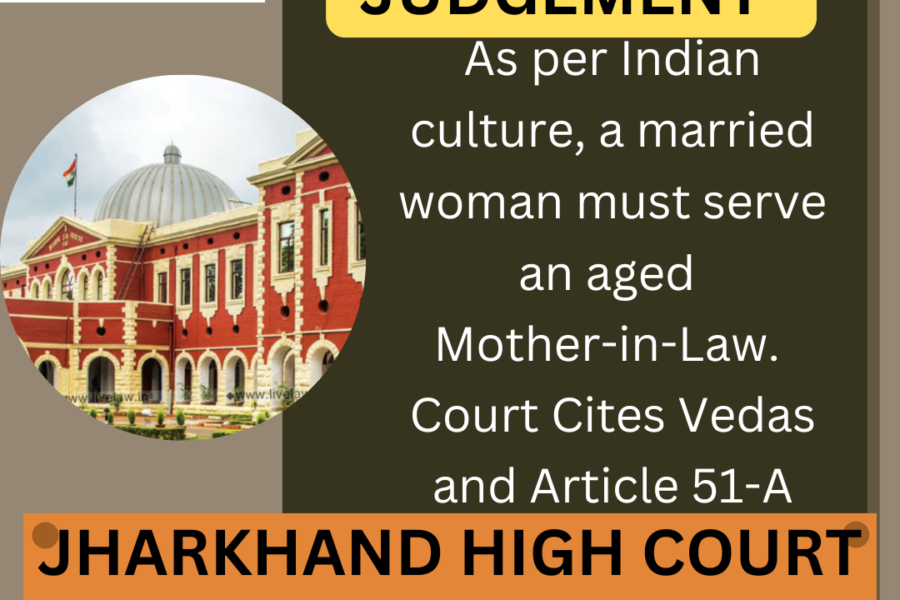Rudra Narayan Ray vs Piyali Ray Chatterjee
Criminal Revision No. 172 of 2022
The Jharkhand High Court has declared that following Indian customs, a married woman is expected to care for her elderly mother-in-law and must do so to continue the tradition. Judge Subhash Chand, a single judge, stated that a wife should not insist on living apart from her husband’s mother and maternal grandmother because she must serve them.
The Court supported its position by citing Article 51A of the Constitution.
“To value and preserve the rich heritage of our composite culture” is one of the essential duties of a citizen listed in Article 51-A of the Indian Constitution (clause (f). To maintain this custom, it is customary in India for wives to take care of their elderly mother-in-law or grandmother-in-law, as the case may be,” the Court emphasised.
It was therefore determined that a lady ought not to coerce her husband to divorce his mother.
The Court emphasised the value of women in families by citing Hindu sacred writings, such as the Manusmriti, in its ruling.
The court replied, “O woman, you do not deserve to be defeated by challenges,” alluding to Yajurveda. You can overcome the most formidable obstacle. You possess a thousand times the courage of your opponents’ troops (Yajurveda).
The court also cited passages from the Manusmriti that said, “Where women are unhappy, the family is soon destroyed; but, where women are disputed, the family always thrives.”
The court made these remarks during the hearing of an appeal filed by a man contesting a Dumka family court ruling directing him to provide ₹15,000 to their young boy and ₹30,000 in maintenance to his divorced wife.
The woman said that to get the dowry, her husband and in-laws mistreated and abused her.
However, the spouse claimed that the spouse pressured him to live apart from his mother and grandmother. He noted that the wife continued to visit her parents’ place without telling him, frequently picking fights with the two elderly people living there.
The wife was forcing the husband to live apart from his mother and grandmother without a good reason, the court concluded, based on the material that was on file.
Justice Chand mentioned a book written by Prof. named Introduction to Family Life Education. Teresa Chacko, who describes the position of a wife in the family, mentioned that the wife’s refusal to care for her elderly mother-in-law and grandmother-in-law—75 and 95 years old, respectively—was the main point of contention between the now-divorced pair.
Her spouse feels under pressure from her to live apart from his mother and grandma. Since the legislature enacted section 125(4) of the CrPC, which provides one of the grounds for maintenance denial—if the wife refuses to live with her husband without a valid reason—because they believe that this ground alone is insufficient, the judge said.
As a result, the single judge overturned the family court’s decision to provide the wife ₹30,000 in maintenance, ruling that she was not entitled to any money because she had not provided a valid reason for moving out from her husband. But the son’s support was increased by the Court from ₹15,000 to ₹25,000.
The bench referenced the following Vedas among others:
- Lines of Yajurveda, which read as under: “O woman you do not deserve to be defeated by challenges. You can defeat the mightiest challenge. Defeat the enemies and their armies you have valour of thousand.” (Yajurveda 13/26)
- Lines of Rigveda: “O brilliant woman, remove ignorance with your bright intellect and provide bliss to all.” (Rigveda 4/14/3)
- Lines of Manu: शोचİȶ जामयो यũ िवनʴȑाशुतत्कु लम्। न शोचİȶ तुयũैता वधŊतेतद् िह सवŊदा ॥ ५७ ॥
“Where the women of the family are miserable, the family is – 22 – soon destroyed, but it always thrives where the women are contended.”
- Lines of Brihat Samhita: “In no world has Brahma created a gem superior to a woman (stri), whose speech, sight, touch, thought, provoke pleasurable sensations. Such a gem in the shape of a woman is the fruit of a person’s good, deeds, and from such a gem a person obtains both sons and pleasure. A woman, therefore, resembles the goddess of wealth in a family and must be treated with respect, and all her wants must be satisfied.” (Brihat Samhita 73:4)
Adv. Khanak Sharma

